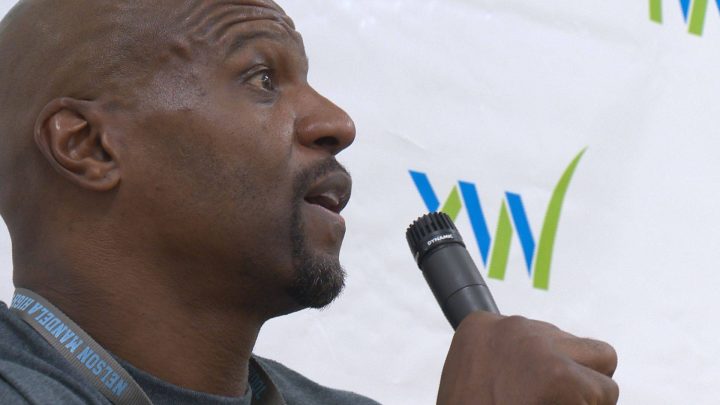Brooklyn Nine-Nine actor Terry Crews felt honoured to speak about society’s definition and perception of masculinity amid the Me Too movement in Calgary on Tuesday.

He was in the city for the 8th annual YWHISPER Gala presented by YW Calgary women’s shelter.
Aside from being an actor, Crews is many things — a husband, a dad, an author, a former NFL player, one of TIME Magazine’s 2017 “Silence Breakers” and a survivor of sexual assault. He’s an activist who discusses the roles men can play in working towards gender equality.
“The biggest question that’s happening right now and has taken over in the last year has been: what is being a man about, now?” he said on Tuesday at Nelson Mandela High School before the gala.
Everyone is trying to navigate the post-Me Too world, he said — some people are confused, others are taking advantage of that confusion.
“I only speak for men because I’m a man,” Crews said. “I don’t speak for women because they have been speaking so eloquently and so wonderfully for thousands of years, but the problem is men have not heard it.”
Complicit past
In his youth, he counted himself as a “card-carrying member of the toxic masculinity creed.”
“I remember seeing women treated a certain way and I just went, ‘That’s the way of the world.’ I totally looked the other way and I was part of a complicit system,” he said.
“I remember being in college and a young lady was raped by a football player and they asked the lady to leave the school because he’s a star. That’s a complicit system.”
Crews said he grew up inundated with the message that men have to have game and keep their girlfriends off-balance by lying to control them.
“The day my wife left me was the beginning of my new life,” he said. “Hollywood doesn’t care if you lose your family.”
Crews realized something in him had to change.

Get breaking National news
“Maybe it’s me, because I had blamed everything else on her, her, them, the fact of where I came from, the hood, the fact that I’m black — you can find many ways to be a victim,” he said. “The table’s always full of excuses. Then I was like, ‘It’s me. I’ve been doing the wrong thing. I believed the wrong message.'”
He revamped and reconciled his whole life to ensure his beliefs aligned with his behaviour, he said.
“The job I have now is, once you’ve done it and rebuilt it, for me to keep it a secret, it wouldn’t be right,” he said.
Give shame back
Crews said that when he was molested, he was not going to tell because of the shame he felt.
“When the women in the Me Too movement came forward about Harvey Weinstein, it broke something free in me… I was like, ‘That happened to me. I’m not alone.’ ”
He had been told he was too big to be assaulted.
“I had to tell everyone that size and strength does not matter when it comes to sexual assault,” Crews said, adding that victims should give the shame back to the perpetrator.
“The thing that happened to you is not your fault.”
Crews’ message is one of accountability.
“People have mixed apologies with accountability,” he said. “So they think it’s the same thing.”
He likened the misunderstanding to a drunk driver doing a hit and run; a person could say sorry and leave, but the accountability comes from the driver staying at the scene until the police arrive, getting arrested or fined, and taking care of those wounded.
“You must take care of every human being that you hurt and try your best to make amends,” Crews said.
Apologies and accountability
For him, sharing stories of his being an accessory to women’s mistreatment and his sexual assault are his accountability.
“I have to tell my story in order to make amends, in order to correct the complicity that I had,” Crews said, adding that it’s important for the healing of people who’ve been wronged and society as a whole.
“This is more important than any movie I could do.”
“You can’t just have the image of a good person. Let’s be a good person. It sounds really simple but it’s really hard to do,” Crews added. “I had an image that was awesome, but then I had to be it and that’s a whole other matter. Once you can be once person and you can walk in it, I’ll never go back.”
Crews said his message to young men is to not speak for women but to check other guys with words, not violence.
“What you do is tell another guy, ‘Hey, man. We don’t do that here.’ It’s so simple,” he said.
“Men need to say, ‘We messed that up. How can we correct it?’ And you talk to the victim and ask them how it can be corrected. You don’t tell them, ‘This is what I’m going to do to correct your situation.'”
Teresa Martin, principal of the high school, said the talk was a great opportunity for students to learn about not being a follower and listening to your own voice.
“When he was growing up, he often listened to other voices and he then realized that wasn’t helping him become the man he wanted to be,” she said. “So I think whether it was for men or women, boys or girls in our assembly, it was about being true to yourself.”
“I think today’s work will go so far in helping us advance our cause, advance our mission, and our work with students each and every day about being the best they can be — even when no one’s watching.”
– With files from Deb Matejicka




Comments
Want to discuss? Please read our Commenting Policy first.